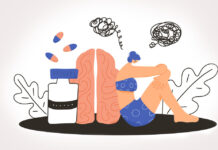Psychiatric Drug Withdrawal in Spain
My study, in which I slowly withdrew people from prescribed antipsychotics and antidepressants, found that it is possible to decrease both spending on psychiatric drugs and patients' chronic exposure to them. In general, the drug-reduction process was well-tolerated and well-accepted among those treated.
New Study Examines User Experience of Discontinuing Psychiatric Medications
Researchers find that support and self-care were helpful for users during discontinuation, but that mental health professionals were not very helpful.
Tapering Strips Help People Discontinue Antidepressants
A new study by Peter Groot and Jim van Os has found that tapering strips help people successfully discontinue antidepressant medications.
Early Death Associated With Antipsychotics
There are a vast number of studies that document the diverse range of side effects caused by antipsychotic drugs. These adverse effects include brain...
10 Things I Learned in 5 Years Consulting With People Coming Off Psych Drugs
It's been over 5 years since I started offering non-medical consultations to people in the process of coming off or hoping to come off psych drugs. I wanted to share here some things I have learned in this process. Despite how far we have come, we have a long way to go in the quest to liberate all who wish to be liberated from psychiatry.
The Temptation of Certainty: David Foster Wallace, Suicide and Psychiatric Drug Withdrawal
While increasing numbers of Americans are being prescribed antidepressants, the Centers for Disease Control reports that suicide rates increased 28% from 1999 to 2010. Trained professionals remain unable to predict who is at risk. Their guess is as good as chance.
Antipsychotic Medications Are Causing Obsessive Compulsive Disorders
Common second-generation antipsychotic medications are causing symptoms of obsessive-compulsive disorder to emerge in many people who previously only had schizophrenia symptoms, according to a...
A Tale of Two Studies
With increasing evidence that psychiatric drugs do more harm than good over the long term, the field of psychiatry often seems focused on sifting through the mounds of research data it has collected, eager to at last sit up and cry, here’s a shiny speck of gold! Our drugs do work! One recently published study on withdrawal of antipsychotics tells of long-term benefits. A second tells of long-term harm. Which one is convincing?
Researchers: Antidepressant Withdrawal, Not “Discontinuation Syndrome”
Researchers suggest that the pharmaceutical industry had a vested interest in using the term “discontinuation” in order to hide the severity of physical dependence and withdrawal reactions many people experience from antidepressants.
Antidepressant Withdrawal: An Unknown Disorder?
Antidepressant withdrawal is no longer an unknown disorder since knowledge on this topic has grown enough to be translated into practice. As proposed by George Engel in 1977, medical doctors, including psychiatrists, can observe and listen to their patients and develop a program to treat withdrawal and restore health.
How to Distinguish Antidepressant Withdrawal from Relapse
Mark Horowitz and David Taylor provide advice on how to tell the difference between antidepressant withdrawal and depression relapse.
Psychiatrists Argue For More Attention to Iatrogenic Harms
Psychiatrists argue that current practice fails to account for the interaction of biological, psychosocial and iatrogenic factors.
Study Highlights Difficulty of Antipsychotic Withdrawal
New research finds insomnia, anxiety, and depression are common symptoms of antipsychotic withdrawal, highlighting difficulties of discontinuation.
Withdrawal Symptoms Routinely Confound Findings of Psychiatric Drug Studies
Researchers examine how rapid discontinuation can mimic the relapse of mental health symptoms and confound psychiatric drug studies.
Antidepressant Withdrawal Misdiagnosed as Functional Disorder
Adverse physiological symptoms of antidepressant withdrawal are regularly mistaken to be other problems to the detriment of the patient.
How Academic Psychiatry Minimized SSRI Withdrawal
If academic psychiatry is evidence-based, why did it take two decades to recognize SSRI withdrawal as widespread and chronic among patients?
How Long Does Antidepressant Withdrawal Last?
The patient experiencing the pain of withdrawal believed that they would feel better when they stopped taking their antidepressants. After all, they’re under the care of a board-certified medical professional who has vowed to do no harm. But despite those reassurances, they find themselves in a world of hurt.
Researchers Provide Guidance for Reducing and Stopping Psychiatric Drugs
New guidance on how to taper and discontinue from psychiatric drugs from leading researchers Mark Horowitz and David Taylor.
Letter to The New York Times: Many People Taking Antidepressants Discover They Can’t Quit
Ten years ago, the recent New York Times article entitled “Many People Taking Antidepressants Discover They Can’t Quit” would have shocked me. I would have dismissed serious medication withdrawal as rare. But I tell my patients something different today.
The Bitterest Pills: The Troubling Story of Antipsychotic Drugs
As I see it this website is about filling the gaping hole in the official literature on mental health problems and their treatment. Since these problems were declared to be diseases, ‘just like any other’, academic papers present them as if they were simply technical glitches in the way the brain or mind works. They can be identified by ticking a few boxes, and easily treated by tweaking the corresponding defect with a drug or a few sessions of quick-fix therapy. What it is like to experience these problems and their treatments is nowhere to be found. Yet in post after post on this site among others, we hear about the harm produced by drugs that are prescribed for mental health problems.
A Different Psychiatry Is Needed for Discontinuing Antidepressants
The problems related to the use of antidepressants cannot be solved by an oversimplified psychiatry brainwashed by the pharmaceutical industry.
Do Antipsychotics Worsen Long-term Schizophrenia Outcomes? Martin Harrow Explores the Question.
Martin Harrow and Thomas Jobe have a new article coming out in Schizophrenia Bulletin that I wish would be read by everyone in our society with an interest in “mental health.” Harrow and Jobe, who conducted the best study of long-term schizophrenia outcomes that has ever been done, do not present new data in this article, but rather discuss the central question raised by their research: Does long-term treatment of schizophrenia with antipsychotic medications facilitate recovery? Or does it hinder it?
Harrow + Wunderink + Open Dialogue = An Evidence-based Mandate for A New Standard...
In the wake of the new study by Dutch researcher Lex Wunderink, it is time for psychiatry to do the right thing and acknowledge that, if it wants to do best by its patients, it must change its protocols for using antipsychotics. The current standard of care, which—in practice—involves continual use of antipsychotics for all patients diagnosed with a psychotic disorder, clearly reduces the opportunity for long-term functional recovery.
Researchers Document Protracted Withdrawal from Antidepressants
Protracted Withdrawal Syndrome characterized by long-term adverse experiences after coming off of antidepressants.
The Maudsley Deprescribing Guidelines: An Interview with David Taylor and Mark Horowitz
Tapering should be tailored and adjusted to the patient, slowed and more hyperbolic in people who have severe and longstanding reactions.




























